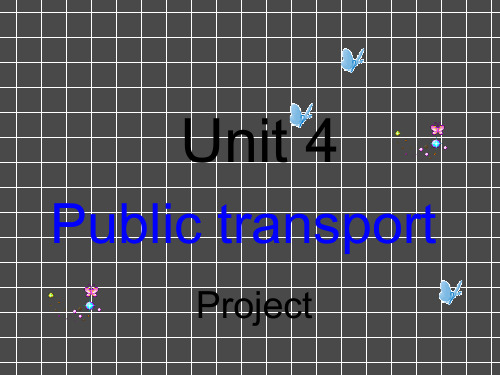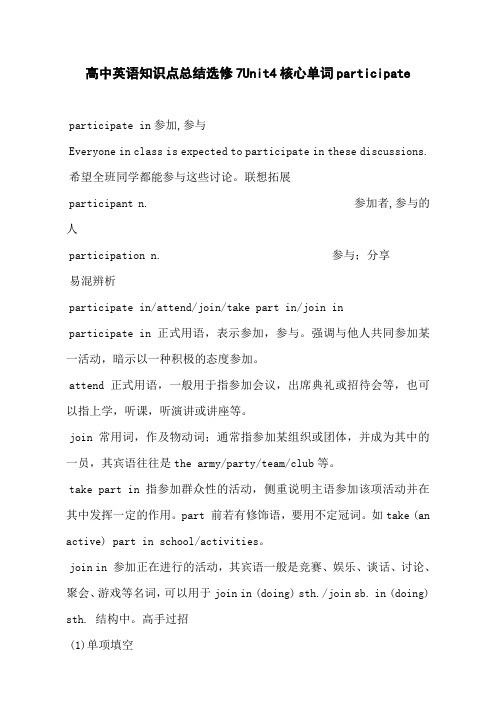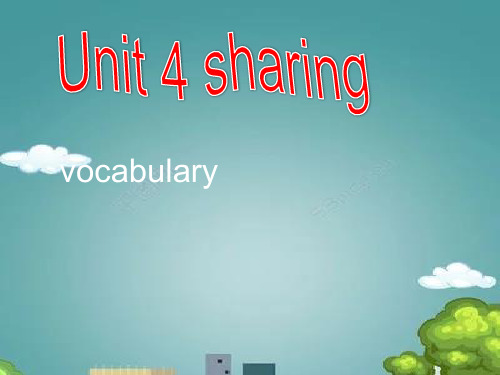part1 选修7 unit4
- 格式:ppt
- 大小:781.00 KB
- 文档页数:36

Senior 2 Book 7 Unit 4 SharingThe First Period教案――姓名Teaching Procedures:Step I Warming Up1. GreetingsT: Have you ever helped others? What did you do to help your parents? Or other relatives? Or your friends? Or people in your community? Or people outside your community? I’m sure you have a lot to say. Ok, let divide into groups of three and finish the survey form. Then in groups, discuss whether someone who helps the groups on the survey form can be called a “volunteer”.Step II Listening(I)(The teacher plays the tape and the students listen to it.)T: Now let’s check the answers of Exercis e 1 and 2.(The students will answer the questions)T: Now let’s listen to the dialogue for a second time. When you are listening, you can check the answers of Exercise 2 and finish Exercises 3 and 4. Learn to make notes about Mary’s experiences in the ta ble on Page 35. And share your notes with your partner and then with other groups.(The students will makes notes, and share their notes.)T: Ok, let’s listen to it for a third time to check the notes.Step III Listening(II)T: Perhaps you may wonder, because we are students, what we can do to help. That is, what can we do to serve communities outside the school? Ok, let do LISTENING in the workbook on Page 70. You are also required to predict what you will hear, according to the four questions.Step V AssignmentT: Boys and girls, today we have listened to two materials about giving help to others. I do hope all of us will help those who need help. Besides, you should learn to predict what you will hear before listening and pay attention to the time expressions while listening.Step VI Homework1. Finish the LISTENING TASK on Page 75-76. Remember to predict what you will hear according to the given information and also pay attention to time expressions.2. Google for more information about MSF and share it between us.。


高中英语知识点总结选修7Unit4核心单词participate
participate in参加,参与
Everyone in class is expected to participate in these discussions.
希望全班同学都能参与这些讨论。
联想拓展
participant n. 参加者,参与的人
participation n. 参与;分享
易混辨析
participate in/attend/join/take part in/join in
participate in 正式用语,表示参加,参与。
强调与他人共同参加某一活动,暗示以一种积极的态度参加。
attend 正式用语,一般用于指参加会议,出席典礼或招待会等,也可以指上学,听课,听演讲或讲座等。
join 常用词,作及物动词;通常指参加某组织或团体,并成为其中的一员,其宾语往往是the army/party/team/club等。
take part in 指参加群众性的活动,侧重说明主语参加该项活动并在其中发挥一定的作用。
part 前若有修饰语,要用不定冠词。
如take (an active) part in school/activities。
join in 参加正在进行的活动,其宾语一般是竞赛、娱乐、谈话、讨论、聚会、游戏等名词,可以用于join in (doing) sth./join sb. in (doing) sth. 结构中。
高手过招。

Unit 4 Sharing教材分析本单元的中心话题是济贫扶弱、志愿服务、合作共享。
教学目的是让学生认识到社会上贫富、强弱的差异和帮助别人的意义,帮助学生树立同情弱者、救困济贫的思想。
学案一W arming Up, Pre-reading and comprehendingTeaching Goals:1.help students understand the meaning of “volunteer activities, showing love activities and sharing”. (帮助学生理解“志愿者活动,献爱心活动,合作共享”等的意义。
)2. develop students to help others who are very poor or have some difficulties in daily life. (培养学生在日常生活中帮助他人,扶贫救困的爱心。
)3. help students develop right values.(帮助学生树立正确的价值观)Step 1. W arming Up1. Lead Ss to the content of this unit.2. Ask Ss to discuss the following question.In what ways do we help the people around?3. Divide Ss into groups and ask them to discuss the following question.Can we call the person who helps others a “volunteer”?Step 2. Pre-readingTeaching aims: To get Ss prepared for the reading text.1.Ask Ss to look at the pictures on P29~P302.do pre-reading exercise on P28.3. Lead Ss to the reading text.”Step 3 homework: 做双语报第31期b1版的主题阅读ReadingTeaching aims:.1. To train the students’ reading ability2.Grasp some important phrases and sentencesStep 1: skimmingSkim and try to divide it into four parts, and summarize what each part is about.Part 1 ( Paragraph 1) : ——————————————————————————————————Part 2 (Paragraph 2-3): ——————————————————————————————————Part 3(Paragraph 4-8): ——————————————————————————————————Part 4 (Paragraph 9) __________________________________________________ Step 2:scanning fill in the following blanks.1. ___ is a young Australian woman.2. ________ was dying to hear all about Jo’s life in Papua New Guinea.3. _______ walked a long way to get to the school.4._______________ didn’t have any textbooks.5. _____became a lot more imaginative when teaching.6. _________ started jumping out the windows during a chemistry experiment.7. _________ visited a village that was the home of one of the boys, Tombe.8. ________ started crying “ieee ieee” to welcome them.9. _________ led us to a low bamboo hut.10.________ was going to share the platform with Jenny and Jo.11. _________ softly talked to each other in their language Jo didn’t understandTrue or force1.The classrooms are made from bricks and the roofs from grass.( )2. It always takes the boys only a few minutes to get to the school.( )3. Science is the most challenging subject for Jo.( )4. When Jo and Jean arrived at the village, they shook hands with all the villagers.( )5. Tombe threw out the tin can because it’s very dirty.( )Step 3 Summary : According to Jo’s school conditions and the local village’s life and customs, fill in the blanks. High school-Jo’s school is a ____ school whose classrooms are made of _____ and roofs of ____. There is no _______ or ____, even no ______. Without ______, the students have no ______of doing experiment. Mostof the students will be going back to their villages after _____.Local village- Tombe comes from a _____ village where people speak special language. People live in the hut which has no _____ and the doorway was _____. The main food they eat are ______, _____ and _____. Villagers believe that _______ attract evil spirit in the night.Step 4. Homework: Read the text loudly and find some difficult sentences.学生可以选做双语报B1版的课文理解部分。

1.选修七Unit1 MARTY’S STORY马蒂的故事Hi, my name is Marty Fielding and I guess you could say that I am "one in a million".你好。
我叫马蒂·菲尔丁。
我想你可能会说我是“百万人中才有一个”的那种人。
In other words, there are not many people like me. 换句话说,世界上像我这样的人并不多见。
You see, I have a muscle disease which makes me very weak, so I can't run or climb stairs as quickly as other people. 你瞧,我的肌肉有毛病,使我的身体非常虚弱,所以我不能像别人那样快跑快步爬楼梯。
In addition, sometimes I am very clumsy and drop things or bump into furniture. 再说,有时候我还会笨手笨脚、不小心摔掉东西,或磕碰到家具上。
Unfortunately, the doctors don't know how to make me better, but I am very outgoing and have learned to adapt to my disability. 不幸的是,大夫们不知道如何治好我的病,但是我很开朗乐观,学会了适应身体的残疾。
My motto is: live one day at a time. 我的座右铭是:活好每一天。
Until I was ten years old I was the same as everyone else. 十岁以前,我跟其他人是一样的。
I used to climb trees, swim and play football. 我常常爬树、游泳、踢足球。

Senior2 Book 7 Unit4 Sharing
The First Period自评稿
――姓名
一:达到目标程度
本节课是选修7第四单元第一课时,内容以Sharing为话题,以谈论分享和帮助为切入点,让学生在听中完成相应练习题目,在听中提高听力,在听中懂得同情,学会分享。
任务主要是让学生“听”,然后以小组合作、自主学习等方式完成有关题目,锻炼学生根据给出的问题预测将要听内容的能力,激发学生的国际意识。
二:教学设计的变化
听力一向是学生的一个难点,为了更好完成本节课的教学任务,提高学生的听力,我在教学过程中引导鼓励学生根据课本所给出的问题来预测将要听的内容,从而进行有目的听。
在本节课的最后,我设计了一个归纳小结的环节,以谈话交流的方式升华了学习任务和目的,照应了前面的教学目标。
三:成功之处
安排了学生根据课本所给出的问题来预测将要听的内容和归纳小结这两个至关重要的环节,既培养了学生的听力,又对学生进行了思想情感的教育,使得本节课脱离了单纯听力练习的俗套,而上升为一节知识技能和情感态度双重培养的成功课。
四:不足之处
课前对学生的听力把握得不是很准确,导致教学内容设计得稍显繁多,影响了教学目标的实现和教学任务的开展,在以后的教学中,自己应该认真备课,尤其是备学情这一方面,争取使自己的课再上一个新的台阶。
- 1 -。